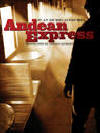Andean Express
Andean Express by Bolivian journalist Juan de Recacoechea follows a slew of intriguing characters on an overnight train ride from Bolivia to Chile.
Andean Express by Bolivian journalist Juan de Recacoechea follows a slew of intriguing characters on an overnight train ride from Bolivia to Chile.
It’s 1952 and Ricardo Beintigoitia has just graduated from high school. He’s catching the train from La Paz, Bolivia, to Arica, Chile, where he spends the end of every school year with his family, and for the first time, he’s traveling alone. On his journey, Ricardo falls in love with the young (and newly married) Gulietta Carletti. Forced into an arranged marriage by her mother, Gulietta is on her honeymoon with a man she loathes, Nazario Alderete, an accountant-turned-mine owner who stole the mine from Gulietta’s own father. It turns out that nearly everyone on the train has a personal vendetta against Alderete, and reminiscent of Agatha Christie’s Murder on the Orient Express, every character has his or her own motive for wanting to get rid of him.
Andean Express succeeds in creating a whodunit element of mystery alongside a cast of quirky characters, but the dialogue is occasionally stilted, as in the following heated exchange between Alderete and Ricardo:
“You won’t see [Gulietta] for many years, maybe never again. An adventure on a train with a married woman – is that what’s missing from your repertoire?”
“You’ve got quite an imagination, even though you’re only an accountant.”
“If you keep bothering her, then I’ll have to use my fists.”
“Why don’t we get off at the next station? That way we can see what you can do with those fists.”
“Careful, pretty boy.”
These sentences feel somewhat forced and unnatural. However, de Recacoechea makes up for the dialogue in his descriptions of the passing landscape. Observe the following vividly rendered paragraphs: “As the sun receded further, it gave way to shadows announcing the hostile Altiplano night, accompanied by an anguished silence,” and
Through the window, the landscape reinvented itself from moment to moment; it was like watching an endless movie, one without pauses or surprises. The Altiplano was a horizontal vertigo, as Drieu de la Rochelle once wrote about the Argentine pampas. Human life had vanished, giving way to a desolate moonscape.
These descriptions of a changing, foreign and occasionally hostile environment anchor the book and serve as an effective backdrop to the diverse and often strange characters that Ricardo encounters on his journey, including a Franciscan priest, an ex-mine worker, a contortionist, a Russian loan shark, a poker player, the owner of a popular cabaret and a former Irish boxer, among others. Everyone has a specific agenda and most involve Alderete.
Amidst all the chaos, Ricardo pursues a relationship with Gulietta, even though “it wasn’t like the Paris-Istanbul or the Trans-Siberian line, where the trip lasts nearly a week and relationships have time to begin, develop, and find reason for hope upon arriving at their destination.” And yet, Gulietta intrigues him. Why did she marry the much older, unattractive and universally despised Alderete? Why is her mother accompanying her on their honeymoon? Can Ricardo and Gulietta’s romance last beyond the Andean plateau? The burgeoning affair between Ricardo and Gulietta simmers seductively throughout the trip, and the sinister motives of the train’s passengers will keep the reader guessing until the thrilling finale.
Despite the uneven dialogue, de Recacoechea masterfully executes a tale of first-class suspense and constructs a sophisticated character-study of Bolivians from all backgrounds and professions.





